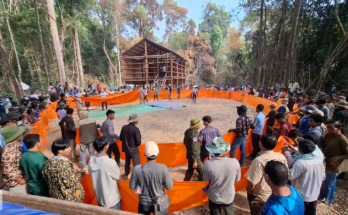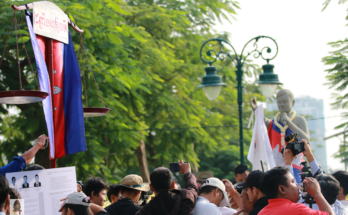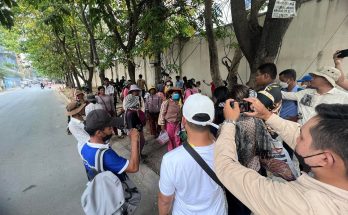Phnom Penh, 14 November 2012 — The Cambodian Human Rights and Development Association (ADHOC) strongly condemns the repeated disruption of civil society meetings taking place as part of the ASEAN Peoples’ Forum and ASEAN Grassroots People’s Assembly 2012. The intimidation of organizers and participants at the meetings is an unacceptable affront to basic freedoms of expression and assembly and sends a powerful message to the world that the Cambodian government is not committed to the creation of an ASEAN that respects fundamental rights and freedoms.
The Civil Society Committee of ASEAN Civil Society Conference/ASEAN Peoples’ Forum (ACSC/APF 2012) has twice been forced to change venue for its regional conference due to the actions of the Cambodian authorities. In the first instance, an independent church—the Christian Fellowship—in which the event was due to take place, was visited by a group of unidentified local officials on 10 November 2012. As a result of this visit the church requested that the regional conference take place elsewhere. The ACSC/APF 2012 was forced to change location to Modern Centre 5. Again, in a second act of intimidation a group of unidentified local officials visited the intended venue and instructed the owner to cancel the contract with the ACSC/APF 2012. The owner claimed that he received the instructions from a senior official. The ACSC/APF 2012 will hold its meetings at a new and as yet undisclosed location in spite of the authorities’ attempts to stifle the voices of ASEAN civil society groups.
The ASEAN Grassroots People’s Assembly (AGPA) has also faced harassment and intimidation by the Cambodian authorities. On 13 November 2012 more than 2,000 people attended the AGPA opening session at Stoeng Meas Restaurant, including union members, community activists, sex workers, indigenous community representatives and civil society representatives from other ASEAN states. Early in the day ADHOC staff reported that their conversations were being monitored; later, the owner of the restaurant was intimidated and the venue refused to sell food or drinks to participants. The power was turned off in the afternoon and the commune authorities prevented the owner from using the restaurant’s generator. The organizers decided to continue with the event, saying: “they can cut electricity, but they cannot cut the power of the people.”
The right to free assembly is crucial to open discussion of political issues, circulation of ideas, and popular control over public affairs—in the domestic as well as the international sphere. Citizens have a fundamental right not only to peacefully express dissent and promote social change, but also to receive information deemed “inconvenient” by their governments.
Ultimately, since freedom of assembly is key to progress, restrictions must be exceptional and fulfill precise criteria to be considered legitimate. Firstly, restrictions to the right to free assembly must be provided by law. Secondly, they must be necessary with respect to specified interests or aims. Lastly, they must be proportionate to the aims pursued. Cambodia is party to international human rights treaties such as the International Covenant on Civil and Political Rights and, in any event, has incorporated the latter’s provisions in its domestic law. Freedom of assembly, in particular, is guaranteed by article 41 of the Cambodian Constitution.
With regard to the ACSC/APF and AGPA, whereas the Cambodian authorities referred to vague “security” aims and “public order” to try to justify their actions, they did not show how peaceful meetings of civil society organizations—which are to be held in private venues, far from the city center, and attended by national and foreign representatives, many of them women or elderly people—threatened public order. The actions taken by law enforcement officials were disproportionate inasmuch as police forces stationed nearby the ASEAN Summit venues are sufficient to ensure the safety of participants and smooth running of the reunion.
The disruption of APF/ACSC and AGPA meetings, the intimidation exercised by Cambodian authorities and the resulting increase in self-censorship are part of a brazen attempt to silence critical voices—yet another stain on the reputation of the country.
In an attempt to show a “good” image of Cambodia to foreign leaders and visitors, the Phnom Penh Municipality have already forced poor children, beggars and street sellers out of the center of the city and into Prey Speu, a so-called social rehabilitation center which had previously been used as a detention facility. Even though the spokesman for the Municipality declared that they were free to leave, in actual fact they have no place to go and are effectively illegally detained for the duration of the ASEAN Summit.
ADHOC therefore urges the Cambodian authorities to stop interfering with peaceful civil society activities and to allow the APF/ACSC and AGPA to go ahead as planned. Cambodia should seize the unique opportunity offered by the ASEAN Summit to show the region’s and foreign leaders that it is serious about the promotion and protection of human rights and democracy.
For more information, please contact:
Mr. Ny Chakrya, Head of Monitoring Section: 011 274 959
Mr. Neil Loughlin, Technical Assistant: 092 648 318
Mr. Nicolas Agostini, Technical Assistant: 078 405 024



